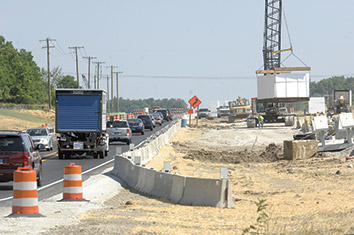Subscriber Benefit
As a subscriber you can listen to articles at work, in the car, or while you work out. Subscribe NowShoring up the state’s road and infrastructure funding is teed up as a major 2016 legislative-session issue. But it remains to be seen what can be done in the upcoming “short” or non-budget-making session, which lasts through mid-March.
Transportation funding is House Speaker Brian Bosma’s top priority. He’s proposed increasing a tax on gasoline, redirecting more of the sales tax collected on gasoline, and imposing a fee on alternative-fuel vehicles as possible options.
“We’re reaching a level where both state and local projects and roads are at risk and we have to have a sustainable responsible funding plan put into place,” Bosma said.
Gov. Mike Pence’s plan to spend $1 billion over the next four years on roads is “a good start,” Bosma said.
Meanwhile, House Minority Leader Scott Pelath has proposed spending $2 billion over the next four years on roads and infrastructure by directing all gasoline and special-fuels sales tax toward those projects. Money lost to the general fund would be made up by spending reserves built up by Pence’s administration.
“I suggest that every dime that’s collected at the gas pump should go to roads and bridges,” Pelath said. “That is prudent. Before you begin asking people to pay more, we have to analyze what’s already being collected.”
Ultimately, the road funding issue will likely have to be tackled in 2017 as well. Some lawmakers, including Long, say the expensive issue needs to be dealt with in a year when they are tasked with creating a two-year budget.
The Indy Chamber is again hoping to squeeze a conversation about commuter tax—something it has long advocated for—into the road-funding debate.
Maintaining local roads and infrastructure is a challenge for Indiana communities that have a significant number of people living outside the county who come into it every day for work, Huber said, because taxpayers pay income tax in their county of residence. It has become more challenging with the advent of property-tax caps.
“That’s a unique structural challenge in Indiana,” Huber said. “We’d love to see a conversation inclusive of non-resident income tax. The situation is only going to get a lot more challenging.”•
Please enable JavaScript to view this content.

